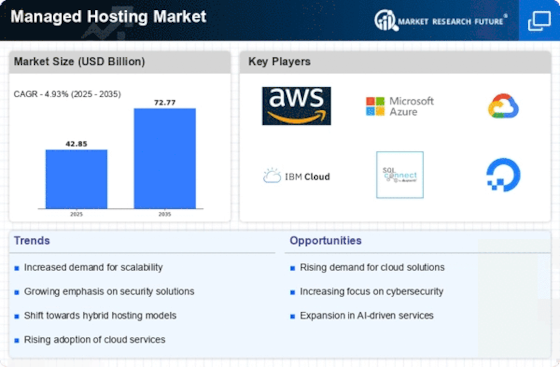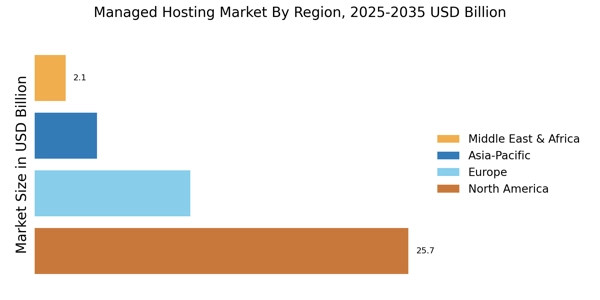Adoption of Hybrid IT Environments
The Managed Hosting Market is witnessing a notable shift towards hybrid IT environments, where businesses combine on-premises infrastructure with cloud services. This approach allows organizations to optimize their IT resources, balancing the benefits of both environments. As companies seek to enhance their operational agility, the demand for managed hosting services that support hybrid models is increasing. This trend is indicative of a broader movement towards flexible IT solutions that can adapt to changing business needs. The hybrid IT market is projected to grow at a compound annual growth rate of over 20%, suggesting a robust opportunity for managed hosting providers to cater to this evolving landscape.
Increased Focus on Cost Efficiency
In the Managed Hosting Market, there is an increased focus on cost efficiency as businesses strive to optimize their IT expenditures. Organizations are seeking managed hosting solutions that provide predictable pricing models and reduce the total cost of ownership. This trend is particularly relevant for small and medium-sized enterprises that may have limited budgets for IT infrastructure. By leveraging managed hosting services, these businesses can access enterprise-level technology without the associated capital expenses. The market is responding to this demand, with many providers offering tailored solutions that align with the financial constraints of their clients. This focus on cost efficiency is likely to drive further growth in the managed hosting sector.
Rising Demand for Scalable Solutions
The Managed Hosting Market is experiencing a notable increase in demand for scalable solutions. Businesses are increasingly seeking hosting services that can grow alongside their operations. This trend is driven by the need for flexibility in resource allocation, allowing companies to adjust their hosting capabilities based on fluctuating workloads. According to recent data, the market for managed hosting is projected to reach USD 70 billion by 2026, reflecting a compound annual growth rate of approximately 12%. This growth indicates that organizations are prioritizing managed hosting services that offer scalability, enabling them to respond swiftly to market changes and customer demands.
Emphasis on Enhanced Security Measures
In the Managed Hosting Market, there is a pronounced emphasis on enhanced security measures. As cyber threats become increasingly sophisticated, businesses are prioritizing the protection of their data and applications. Managed hosting providers are responding by implementing advanced security protocols, including encryption, firewalls, and intrusion detection systems. The market is witnessing a surge in demand for services that ensure compliance with regulations such as GDPR and HIPAA. This focus on security is not merely a trend; it is a necessity for organizations that handle sensitive information. The increasing investment in security solutions is expected to drive growth in the managed hosting sector, as companies seek to mitigate risks associated with data breaches.
Growing Importance of Managed Services
The Managed Hosting Market is seeing a growing importance of managed services as businesses recognize the value of outsourcing their IT infrastructure. Companies are increasingly turning to managed hosting providers to handle their server management, maintenance, and support. This shift allows organizations to focus on their core competencies while leveraging the expertise of specialized providers. Recent statistics indicate that the managed services market is anticipated to grow significantly, with projections suggesting a value of USD 300 billion by 2025. This trend underscores the potential for managed hosting services to thrive as businesses seek to enhance operational efficiency and reduce costs through outsourcing.

















